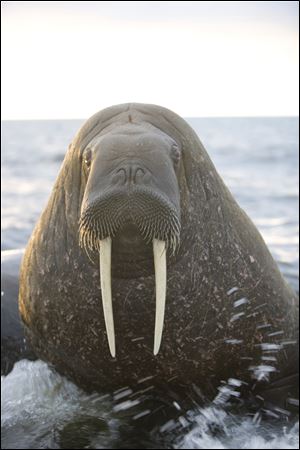
Animals get the spotlight
5/26/2009
A walrus was filmed in Norway for 'Arctic SUmmer.'
After its huge success with Planet Earth two years ago, it's no surprise that Discovery Channel would attempt more natural-science epics. Nature's Most Amazing Events promises to be another high-definition, eye-popping extravaganza.
Two episodes air Friday through Sunday, beginning at 8 p.m. each day on Buckeye CableSystem Channel 23. Self-explanatory episode titles include Surviving the Serengeti, Army of Predators, Kalahari Flood, and Pacific Feast.
Series producer Karen Bass, who did not work on Planet Earth, said that previous splashy special offered a fantastic overview of habitats. Nature's Most Amazing Events has a different goal.
"What we wanted to do with this series was get up close and personal with one part of the planet (in each episode)," she said in a phone interview from Bristol, England. "Get in there and tell one epic and intimate story about one event, one seasonal change."
It's epic in the sense that seasonal changes drive these events and intimate by looking at specific animal behaviors.
"This drama unfolds over a few weeks and months," Bass said. "We wanted to show the intimate lives of the creatures caught up in this drama, the stories of the creatures themselves caught in these great planetary forces."
Friday's premiere hour, Arctic Summer, chronicles the spring thaw and what the annual sea ice melt means to the animals in this habitat, including polar bears, arctic foxes, narwhal whales, and flocks of birds. There are playful scenes and images of one creature devouring another.
"I think you always have to be sensitive to a family audience; you'd be irresponsible if you weren't," Bass said. One sequence in the series shows an elephant getting taken down by lions; another scene shows killer whales attacking a sea lion both from the vantage of above and beneath the water's surface.
"You can have a powerful, dramatic sequence, but you don't have to be graphic about it. It's important to show these dramatic events because they do happen and it's in the context of the story. It would be gratuitous if it wasn't part of the understanding of the species whose story you're trying to tell."
Bass said the series was produced during a 25-month period.
"The most important thing is being in the right place at the right time," she said, noting that timing is ultimately more important than all the technologically advanced techniques for filming.
"If you're not in the right place at the tight time, it doesn't matter if you have a Polaroid camera or a full crew. Pulling all those elements together is the real little miracle out there."
The Block News Alliance consists of The Blade and the Pittsburgh Post-Gazette. Rob Owen is the TV editor for the Post-Gazette.
Contact him at:
rowen@post-gazette.com